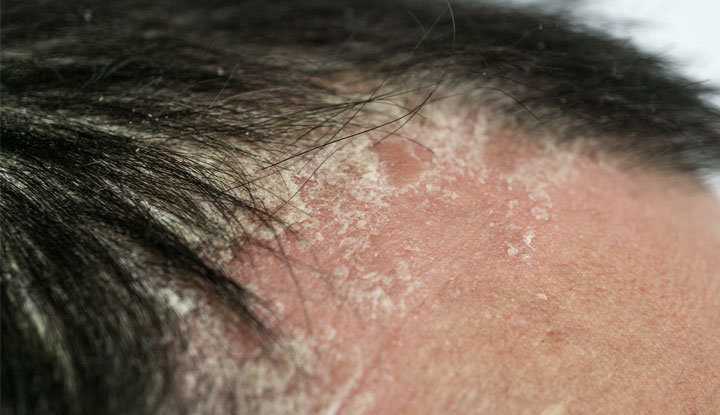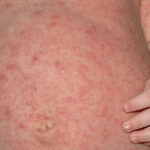Scalp psoriasis is a chronic inflammatory skin condition that manifests as scaly, itchy, and inflamed patches on the scalp. It is a subtype of plaque psoriasis, an immune-mediated disease that accelerates the turnover of skin cells, leading to thickened plaques and silvery-white scales. Though not contagious, scalp psoriasis significantly affects quality of life due to discomfort, embarrassment, and the social stigma associated with visible scaling.

Causes and Pathophysiology of Scalp Psoriasis
Scalp psoriasis arises from an autoimmune response, where T-cells mistakenly attack healthy skin cells, triggering rapid epidermal proliferation and inflammation. This leads to the characteristic plaques.
Key Contributing Factors:
- Genetics: Family history is a major risk factor.
- Immune Dysregulation: Inappropriate T-cell activation.
- Environmental Triggers:
- Stress
- Cold weather
- Infections (e.g., streptococcal throat infection)
- Medications (beta-blockers, lithium)
- Skin injury (Koebner phenomenon)
Clinical Presentation: Identifying Scalp Psoriasis Symptoms
Scalp psoriasis can range from mild scaling to severe crusted plaques covering the entire scalp. It often extends beyond the hairline to the forehead, nape, and ears.
Common Symptoms:
- Silvery-white or gray scaling
- Persistent itching or burning
- Dryness and flaking resembling dandruff
- Redness and inflammation
- Bleeding from excessive scratching
- Hair loss (usually temporary due to inflammation or scratching)
Diagnosis of Scalp Psoriasis
Clinical Diagnosis
Most diagnoses are made clinically through visual examination of characteristic plaques and symptoms. Dermatologists may use a dermatoscope to differentiate from seborrheic dermatitis.
When Biopsy Is Needed
A skin biopsy is occasionally performed to rule out:
- Seborrheic dermatitis
- Lichen planopilaris
- Tinea capitis
- Cutaneous lupus erythematosus
Differential Diagnosis: Scalp Psoriasis vs. Other Scalp Conditions
| Condition | Differentiating Features |
|---|---|
| Seborrheic dermatitis | Greasy, yellow scales with milder inflammation |
| Tinea capitis | Fungal culture positive; broken hairs, black dots |
| Atopic dermatitis | Associated with personal/family history of allergies |
| Lichen planopilaris | Follicular plugging and scarring alopecia |
Treatment Options for Scalp Psoriasis
Management aims to reduce inflammation, scale buildup, and itching while improving scalp health. Treatment depends on severity and response to previous therapies.
Topical Treatments
- Corticosteroids (e.g., clobetasol, betamethasone): Anti-inflammatory
- Vitamin D analogs (calcipotriol): Normalize keratinocyte proliferation
- Coal tar preparations: Slow down skin cell turnover
- Salicylic acid: Keratolytic agent aiding scale removal
- Shampoos containing:
- Tar
- Ketoconazole
- Zinc pyrithione
Systemic Treatments (for moderate to severe cases)
- Methotrexate
- Cyclosporine
- Acitretin
Biologic Therapies
Targeted immunomodulators for patients unresponsive to conventional treatments:
- TNF-alpha inhibitors (e.g., etanercept, adalimumab)
- IL-12/23 inhibitors (ustekinumab)
- IL-17 inhibitors (secukinumab)
- IL-23 inhibitors (guselkumab)
Scalp Psoriasis Care Tips and Maintenance
To manage flare-ups and maintain scalp health, long-term scalp care is essential.
Recommended Scalp Care Practices:
- Avoid scratching: Use cold compresses or antihistamines to reduce itch
- Gentle cleansing: Use non-irritating, medicated shampoos
- Scale softening: Apply warm olive oil or salicylic acid before shampooing
- Hair grooming: Brush gently to reduce plaque buildup
- UV therapy: Natural sunlight or phototherapy under guidance
Lifestyle Modifications
- Manage stress through mindfulness and relaxation techniques
- Follow an anti-inflammatory diet rich in omega-3 fatty acids
- Avoid triggers such as alcohol, smoking, and certain medications
Scalp Psoriasis and Quality of Life
The psychological burden of scalp psoriasis is substantial. Social embarrassment due to flaking and visible plaques can lead to anxiety, depression, and reduced self-esteem.
Support and Counseling:
- Access to dermatology-led support groups
- Cognitive behavioral therapy (CBT) for stress management
- Patient education for treatment adherence
Prognosis and Long-Term Management
While scalp psoriasis is chronic and may relapse, effective management allows most patients to achieve significant symptom control. Biologic therapies have transformed outcomes for many individuals with moderate to severe disease.
Monitoring:
- Regular follow-up with dermatologists
- Periodic assessment for treatment side effects
- Monitoring disease progression with standardized scoring (e.g., PASI, PSSI)
Summary: Key Facts About Scalp Psoriasis
| Feature | Description |
|---|---|
| Cause | Autoimmune response involving T-cells |
| Common Symptoms | Scaling, itching, redness, flaking |
| Diagnostic Tools | Clinical exam, biopsy (occasionally) |
| First-Line Treatment | Topical corticosteroids and medicated shampoos |
| Advanced Therapy | Systemic immunosuppressants or biologics |
| Common Triggers | Stress, infections, skin trauma, cold climate |
| Chronic Nature | Lifelong management often required |
Scalp psoriasis is a challenging yet manageable condition that demands a multidisciplinary approach encompassing dermatological care, patient education, and lifestyle adjustments. With advancements in therapeutic options, most patients can achieve remission and maintain a high quality of life.

